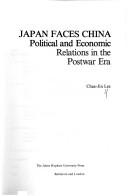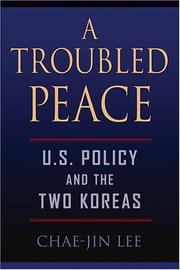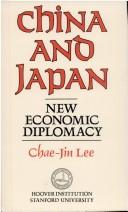| Listing 1 - 10 of 18 | << page >> |
Sort by
|
Book
ISBN: 0804723028 Year: 1994 Publisher: Stanford Stanford University Press Stanford California
Abstract | Keywords | Export | Availability | Bookmark
 Loading...
Loading...Choose an application
- Reference Manager
- EndNote
- RefWorks (Direct export to RefWorks)
S05/0230 --- Prime ministers --- -Chancellors (Prime ministers) --- Chief ministers (Prime ministers) --- First ministers (Prime ministers) --- Premiers (Prime ministers) --- Cabinet officers --- Heads of state --- China: Biographies and memoirs--Zhou Enlai --- Zhou, Enlai --- -Childhood and youth --- -China: Biographies and memoirs--Zhou Enlai --- -Chou, En-lai --- Childhood and youth --- Zhou, Enlai, --- Chou, En-lai, --- Shuwāyn Lāy, --- Chzhou, Ėń-laĭ, --- Tschou, En-lai, --- Shū, Onrai, --- Ciu, En-lai, --- Chu, Ŭl-lae, --- Zhouenlai, --- Chu, Ân Lai, --- 周恩来, --- Childhood and youth. --- Chou, En-lai --- China --- Biography --- 周恩来 --- 周恩來

ISBN: 0801817382 9780801817380 Year: 1976 Publisher: Baltimore (Md.): Johns Hopkins University press,
Abstract | Keywords | Export | Availability | Bookmark
 Loading...
Loading...Choose an application
- Reference Manager
- EndNote
- RefWorks (Direct export to RefWorks)
Japan --- China --- Foreign relations --- Foreign economic relations --- #SBIB:327.6H30 --- #SBIB:327.1H20 --- Internationale en diplomatieke relaties: periode 1945 - 1989 --- Sociologie van de internationale betrekkingen: algemeen --- -Foreign relations --- -Foreign economic relations --- -#SBIB:327.6H30 --- -Japan --- Japan - Foreign relations - China --- China - Foreign relations - Japan --- Japan - Foreign economic relations - China --- China - Foreign economic relations - Japan
Book
ISBN: 303030499X 3030305007 Year: 2020 Publisher: Cham : Springer International Publishing : Imprint: Palgrave Macmillan,
Abstract | Keywords | Export | Availability | Bookmark
 Loading...
Loading...Choose an application
- Reference Manager
- EndNote
- RefWorks (Direct export to RefWorks)
This is a unique and definitive study to reassess the complex dynamics of US-Korea diplomatic relations during the Reagan presidency. It examines the goals, methods, and legacy of Reagan’s policy toward Korea with emphasis on the realities of alliance politics and the tactics of quiet diplomacy. It questions a widely held view that Reagan showed simplistic, inattentive, and rigid approaches toward foreign affairs, arguing that his actual policy, as demonstrated in the Korea case, was more sophisticated, nuanced, and pragmatic than commonly assumed. Based on a vast amount of confidential diplomatic documents, especially in Korean, and interviews the author has conducted with US and Korean leaders, Lee sheds new light on Reagan's role in promoting democratization in South Korea as well as his engagement with North Korea.
Reagan, Ronald. --- Reagan, Ronald W. --- Reagan, Ronald Wilson, --- Rīkǣn, Rōnan, --- Reĭgan, R., --- Reagan, Ronnie, --- Reĭgan, Ronalʹd Uilson, --- Reĭgŭn, Ronald, --- Rījān, Rūnāld, --- Rayjān, Rūnāld, --- Reigŏn, Ronaldŭ, --- Lieh-ken, --- Lei-ken, --- World politics. --- United States—Politics and government. --- United States—History. --- Diplomacy. --- International relations. --- Political History. --- US Politics. --- US History. --- Foreign Policy. --- Coexistence --- Foreign affairs --- Foreign policy --- Foreign relations --- Global governance --- Interdependence of nations --- International affairs --- Peaceful coexistence --- World order --- National security --- Sovereignty --- World politics --- History --- International relations --- Colonialism --- Global politics --- International politics --- Political history --- Political science --- World history --- Eastern question --- Geopolitics --- International organization --- America --- United States --- American Politics. --- Politics and government. --- History.

ISBN: 0801889278 9780801889271 9780801883309 080188330X 9780801883316 0801883318 Year: 2006 Publisher: Baltimore Johns Hopkins University Press
Abstract | Keywords | Export | Availability | Bookmark
 Loading...
Loading...Choose an application
- Reference Manager
- EndNote
- RefWorks (Direct export to RefWorks)
His objective, comprehensive, and definitive study reveals a dynamic--and incredibly complex--series of relationships underpinning a troubled and tenuous peace.
Korea (South) --- United States --- Korea (North) --- Korea --- Foreign relations --- Korea [North ] --- Korea [South ]
Book
Year: 1970 Publisher: Lawrence (Kan.) : University of Kansas. Center for East Asian studies,
Abstract | Keywords | Export | Availability | Bookmark
 Loading...
Loading...Choose an application
- Reference Manager
- EndNote
- RefWorks (Direct export to RefWorks)
Digital
ISBN: 9783030305000 Year: 2020 Publisher: Cham Springer International Publishing :Imprint: Palgrave Macmillan
Abstract | Keywords | Export | Availability | Bookmark
 Loading...
Loading...Choose an application
- Reference Manager
- EndNote
- RefWorks (Direct export to RefWorks)
This is a unique and definitive study to reassess the complex dynamics of US-Korea diplomatic relations during the Reagan presidency. It examines the goals, methods, and legacy of Reagan’s policy toward Korea with emphasis on the realities of alliance politics and the tactics of quiet diplomacy. It questions a widely held view that Reagan showed simplistic, inattentive, and rigid approaches toward foreign affairs, arguing that his actual policy, as demonstrated in the Korea case, was more sophisticated, nuanced, and pragmatic than commonly assumed. Based on a vast amount of confidential diplomatic documents, especially in Korean, and interviews the author has conducted with US and Korean leaders, Lee sheds new light on Reagan's role in promoting democratization in South Korea as well as his engagement with North Korea.
International relations. Foreign policy --- Politics --- History of North America --- communicatie --- geschiedenis --- politiek --- wereldpolitiek --- internationale betrekkingen --- United States of America
Book
Year: 1970 Volume: 6 Publisher: [Lawrence] : Center for East Asian Studies, University of Kansas,
Abstract | Keywords | Export | Availability | Bookmark
 Loading...
Loading...Choose an application
- Reference Manager
- EndNote
- RefWorks (Direct export to RefWorks)
China --- Laos --- Foreign relations
Book
ISBN: 9780429035630 9780367005771 9780367155643 Year: 2021 Publisher: Milton Taylor & Francis Group
Abstract | Keywords | Export | Availability | Bookmark
 Loading...
Loading...Choose an application
- Reference Manager
- EndNote
- RefWorks (Direct export to RefWorks)
The educational system in China's Yanbian Prefecture presents a relatively successful model for Korean ethnic education. Koreans in China have a much higher percentage of literacy and middle school and college graduation than the national average or any other minority nationality. Despite the integrationist impulses of the Chinese nationality policy during the Rectification Movement and the Cultural Revolution, the Korean minority has successfully sustained its ethnic identity. Central to the well-being of the Korean minority in China is its continuing achievement of the highest level of educational attainment. Within the moderate nationality policy currently enunciated by Beijing, the ethnically based education system of the Korean minority in Northeast China presents a program to be studied and emulated by other minority nationalities.

ISBN: 0817979719 Year: 1984 Publisher: Stanford Hoover institution press
Abstract | Keywords | Export | Availability | Bookmark
 Loading...
Loading...Choose an application
- Reference Manager
- EndNote
- RefWorks (Direct export to RefWorks)
China --- Japan --- Foreign economic relations
Book
ISBN: 0817979735 Year: 1984 Publisher: Chicago : Hoover Institution Press,
Abstract | Keywords | Export | Availability | Bookmark
 Loading...
Loading...Choose an application
- Reference Manager
- EndNote
- RefWorks (Direct export to RefWorks)
On the basis of a judicious use of indigenous materials and field research conducted in China and Japan, the author examines Sino-Japanese economic diplomacy. This original in-depth analysis concentrates on a few salient cases of Sino-Japanese economic interaction: a multibillion-dollar steel complex at Baoshan, the joint offshore oil development in the Bohai Sea, and Japanese government loans provided to fund China's important construction projects.
| Listing 1 - 10 of 18 | << page >> |
Sort by
|

 Search
Search Feedback
Feedback About UniCat
About UniCat  Help
Help News
News